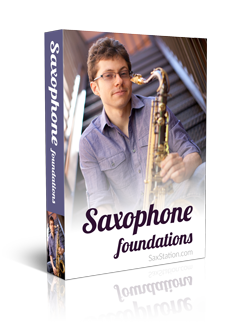When you take your solo and you can see the people in the crowd watching and listening, it feels good. Then standing up on stage and hearing the applause from the audience right after you finish your solo gives you a rush.
Improvisation for a saxophone player is essential for jazz, blues, salsa, and many other styles of music.
From a saxophone player that took this class:
“Mentioned to you before but doesn’t help singing your praises– really like these bite sized lesson plans. Well organized. I can go back and back to pick up all the diverse elements of playing a sax which remind me how to eat the elephant piecemeal.”
-Lance Clark

Here’s What I Got:
I have been running teaching about saxophone online for a while and I keep getting requests to learn about improvisation on sax. So I decided to put together another online class that would focus on improvisation.
My background is mostly with jazz and from there I played reggae, blues, salsa, and some other styles. There’s a clip of a solo I took with my salsa band on the right side of the page.
Week 1
1: Welcome/Overview, Listening & Picking a Favorite Sax Player
-Having a favorite sax player and listening in general is one of the most important activities to become a better musician. The dots and lines on a piece of sheet music are only a rough guideline to the music. Listening will make you play your sax so that music comes out.
2: Saxophone Maintenance
-It’s a hassle to deal with a saxophone that doesn’t quite right. It’s good to know whether you’re causing a problem or there’s a leak or other problem with your sax.
3: Notes vs Groove
-A lot of times as sax players we worry about notes. Sometimes if you play a ‘wrong’ note, you’ll get so caught up that you lose the music. The whole idea of a ‘wrong’ note is something that is more useful in a very oversimplified understanding of music. Learning that keeping the groove is more important than playing the ‘right’ note will make you sound much better.
Week 2
1: Improvisation Philosophy & Anxiety
-Your approach to saxophone- how you practice and play will determine how good you sound. Getting over anxiety will also make you sound better and enjoy the music more.
2: Tone
As sax players, our tone is fundamental. A player like Stan Getz is recognizable a second into playing a single note. Developing your tone will help bring your personality into the music the way you want it to.
3: Feel/Emotion
-Sax players are known to ‘wail’ sometimes and really get a lot of feeling into the horn. The emotion and feeling helps connect you to the audience and tell your story.
Week 3
1: Technique
-Technique on sax isn’t the most important thing, but without it you won’t be able to express yourself clearly. Being able to articulate clearly what you’re saying, move between different places cleanly, and using technique that will prevent you from hurting yourself is an important part of playing sax.
2: Classical Music with examples
-Classical music is a great place to practice your technique. Even if you don’t perform it, the lessons that it can teach you will help you with music in general.
3: Resources
-You’ll get pointed towards more resources that can help you get more with technique.
Week 4
1: Learning tunes
-You don’t get on stage and perform scales. People like to hear tunes. Knowing songs is an important part of being a sax player.
2: Chords and chord movement
-Understanding what the rhythm section is doing and locking in with them will make your saxophone playing sound better.
3: Breaking tunes down & simplifying your approach
-Songs can seem harmonically intimidating sometimes. But there are some tricks to make them simpler and easier to follow.
Week 5
1: Rhythm breakdown- the protractor analogy
-George Young taught me this effective analogy for thinking about time.
2: Articulation/Duration
-Articulation is sometimes overlooked by sax players, but it is an important part of getting the right nuances for different styles.
3: Tempo
-Sometimes you’ll hear a band play songs that are all the same speed. Tempo can change the mood and being able to play well on both slow ballads and a barn burners will make you a sax player that can play in many situations.
Week 6
1: Interacting with a group
-Playing nicely with the other musicians will make the music a better experience for the listener.
2: Space/rest
-Another often overlooked element of music.
3: Phrasing
-You can learn a lot about phrasing by transcribing and emulating, not only sax players, but also singers and other musicians. Phrasing will help define your style.
Week 7
1: Practicing improvisation
-You CAN practice improvisation. It’s not just magic. (Although there is a little bit of that in there)
2: Solo development
-If you say everything you want to say in the first four bars of your solo, what happens after that?
3: Dynamics
-Using dynamics adds contrast and shape to your sax playing
Week 8
1: Chords & active ingredients
-Certain chord tones make much more of an impact than others.
2: ii V7 I Progression
-This chord progression comes up ALL the time in music, you should know how to deal with it.
3: Transcribing
-This is one of the most important things you can do to get better on saxophone.
Here’s What It Will Do For You:
For each lesson, I’ll share simple, but powerful techniques that will take your sax playing to a whole new level. We’ll have a brief lesson and I’ll demonstrate techniques with online videos, then I’ll give you a little something to practice for that day. The videos will be like a classroom environment. I will include examples and you can also send me clips/videos of yourself playing. Those parts will depend on your questions and level.
I’ll even have additional call-in times when you can ask questions and get feedback on your playing.
Here’s what I have been hearing about the class:
I’m in Bro…..how much and when do you want it?
-Delroy
I’m interested.. How can I sign up?
-Ken
I’m really interested in this idea of yours. Tell me more details.
-Stavros
Neal, great idea and just in time because there are three large jazz camps getting ready to kick off that are very expensive. Stanford’s, Oakland Jazz Camp’s, and Jamey Abersolds. Hey! You never know where this could go!!
-Yvonne
That’s great, let me know when you put it together and the cost
-Mike H.
I think this is a great idea and would be the perfect thing to kick start my plan of learning to improvise over the summer.
I think the one thing I’d like to see aside from the general “how-to” is the best way to practice improvisation, because that’s really what’s been keeping me from doing it. I hope to use your program to learn the basics that I can build off of but most of all I want to know how to keep going with it on my own.
-Mike J.
Here’s how the class works:
The lessons are recorded, so once they are available you can watch them when it works for you any time after they are released. You don’t have to worry about the time zone issues.
The video lessons are converted to a flash format that is displayed within the page. If you can watch videos on Youtube, these should work on your computer. There are also some pdfs and audio (mp3) components.
If there are any technical problems, just let me know and we can sort them out.
60 Day Guarantee:
If for any reason you’re not happy with the class, you may receive a refund.
Closed for Registration
Here’s What You Gotta Do Next:
Contact me if you’re interested.



Neal, this is a great idea, but we have to make sure that our equiptment is compatible to view the lessons. And I would be glad to come your monterey workshop.
I’ve always wanted to learn the saxophone. I played the flute in high school (which, btw, was a LONG time ago) but I’ve seen saxophone players on the streets and it’s so cool!
You should learn to play! The fingerings are similar to flute. Having a reed is a little different, but you could learn.
YvonneM that will be a good transistion for you, and your great sound will come natural. Have you chose your sax yet?
Neal, in the improv class can you explain the solo notaions that many of the play along books contain. Like “Summer Time” it sound bluezy but it’s not a hard bluezy song and I do not know how to adjust my playing to make it sound more jazzy with a dab of blues.
Hey Yvonne, I think I can do that. You’re talking about the chord notation and what to play over it?
Learning to play any instrument is a lifelong process. There are many highs and lows during your journey. You have to be patient and realize that music is a journey. long tones, overtones, bad notes, screeching, scales, theory, improvisation, people tellingbyou to stop playing because you are bothering them, other musicians sometimes trying to discourage you because you are getting better and their ego can’t handle it. parents telling you to become a doctor. Then there is that moment when you realize that music is something you love and cannot do without because it makes you feel joy. you can’t explain it but when you create something from nothing and it sounds beatiful you know you have hit on something. don’t let anyone tell you you are no good. keep playing no matter what. My parents wanted me to be a lawyer. i teach music and play the saxophone because i love it. when i was younger i wanted to play like charlie parker. i studied the parker omnibook of transcribed solos and was never ever to play the solos the way parker did. i stopped playing for about a year and finally had to pick up the horn again. at that moment i knew i would never be able to play like parker because there was only one BIRD and i had to be me. when i accepted my own sound i reached the next level of musicianship. its a journey , enjoy the ride.
there is alot of info out there. if it can be shared, cool. you have to woodshed. there are no shortcuts. you can’t buy dues, they have to be earned. i have spent years practicing and i continue.
i need to learn saxophone, id love to, but i cant find a book to teach me that
I would like to be able to bebop as smooth as connonball Aderly and as fast as charlie parker. i need help.
Hey Sam, that’s going to take some work! To be smooth and fast, you have to start off slowly and master the saxophone. Practicing with a metronome will help a lot with speed. And you’ll get more comfortable with mastery.
Hello Neal, Welcome from the midwest Topeka Ks.I am a 52 yr. old young guy, with a passion and love for this gift that I’ve been blessed with MUSIC!! I find your Sax Station site very helpful. I need a young pro like your self to help me with questions,or tips that I may have;like sight reading music, a quick way. Thanks for your time. Check out our cds on CD BABY .COM!!! I will get back with you later got to go. KEEP JAMMMING!!!!!
Neal: looking to register for your online course…have you pulled this together yet?
Great having you in the class Lance!